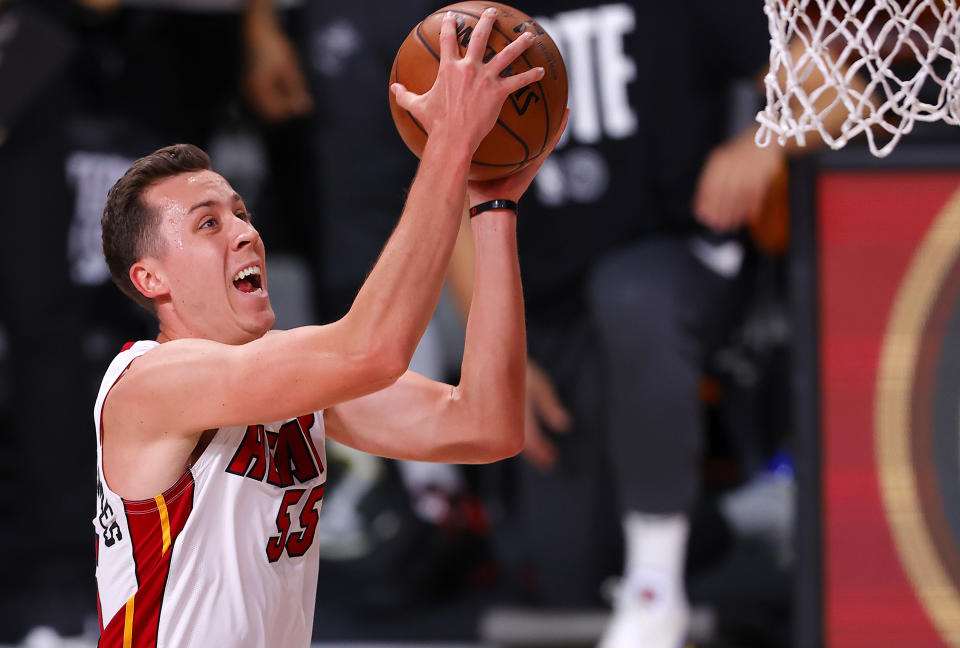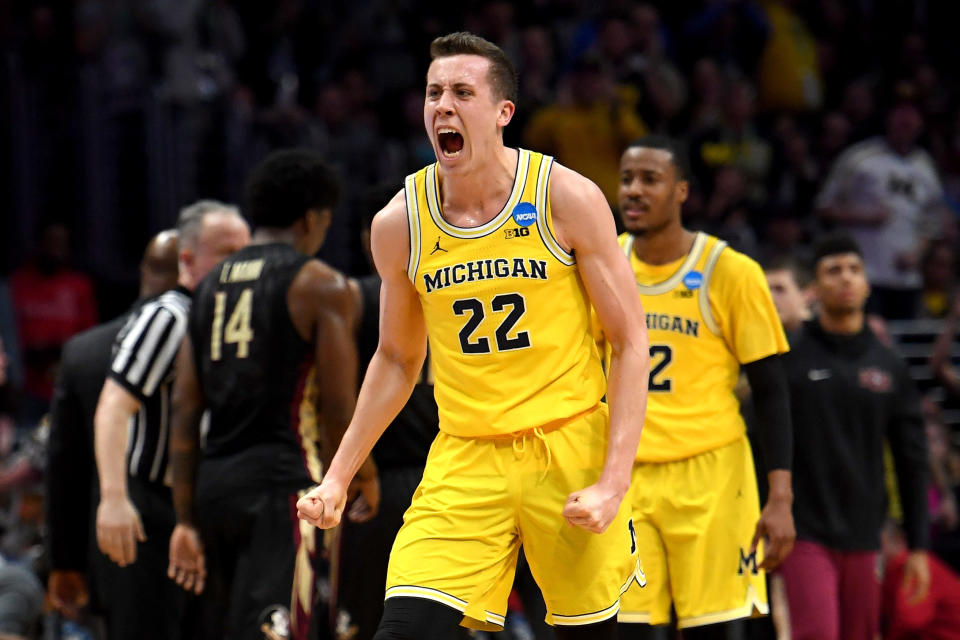Duncan Robinson’s remarkable rise from D-III obscurity to the NBA Finals
Duncan Robinson’s college debut was ruined by a ceiling. Literally. On Nov. 15, 2013, seven years before he’d start for the Miami Heat in the NBA Finals, Robinson was a tentative freshman at Division III Williams College. Williams opened its season against a 400-student school that no longer exists. A scheduling conflict forced the game off campus, five miles east, to the Massachusetts College of Liberal Arts. Amsler Gymnasium’s yellow and navy bleachers held 808 fans. Approximately zero knew they were watching a future NBA assassin.
And how could they have? Robinson, a scrawny 6-7 wing, hadn’t officially been named a starter until the season’s eve. He played 22 minutes that day. He scored 13 of his team’s 87 points. And Williams, a top-three team in preseason polls, was struggling, down one in crunch time to a team it usually crushed.
That’s when Dan Wohl, a junior guard, took the ball out of bounds on his own baseline and chucked a full-court pass. It only got halfway. A low-hanging ceiling structure intervened.
Seconds later, after a missed free throw gave Williams life, Wohl got a second chance — and hit the ceiling again. The heavily favored Ephs lost. A few dozen traveling fans stormed the floor. Players trudged back to their locker room. Tears trickled. Frustration boiled.
“What is this?” Dan Aronowitz, Robinson’s classmate, remembers thinking. “Is this how every game is?”
Nowadays, of course, they can laugh about it. In part because nowadays, it’s a humorous reminder of how far Robinson’s career had to come. He’ll play on the sport’s biggest stage Friday night, just as he has been all season. The stages he began on, though? Slightly smaller.
“I don't think there's too many people in the world that have ever had that kind of a rise,” says Mike Crotty, Robinson’s AAU coach. “It's really unprecedented.”

Duncan Robinson arrives at Williams
Robinson grew up in New Castle, New Hampshire, an island town of less than 1,000 just off the East Coast. His elementary school graduating class could be counted on one hand. He was 5-8 as a high school freshman. He still came off the bench as a junior. He hadn’t played AAU basketball. He was, needless to say, not a big time prospect.
But he loved the game. He worked with a local trainer. He joined Crotty’s AAU program, the Middlesex Magic, as a senior. He forwent a summer job as a line cook so he could play, play, play. During a postgraduate year at a New Hampshire boarding school, he got his Williams offer. DI programs flirted, and YouTube videos labeling Robinson the “Biggest college steal in 2013” circulated but he stayed committed to the DIII power.
And when he arrived, teammates immediately saw talent. They saw an insatiable work ethic. But they also saw a normal dude. Relatively introverted. Often laid-back, extremely kind, occasionally comical. “Like any Williams kid, he had his quirks,” Aronowitz says. “He used to always sing rap songs to himself, without music. He would memorize lyrics and rip these one-liners all the time. And we used to have some absolute battles in FIFA, and [NBA]2K. I would always get the better of him, of course.”
On the court, despite his effortless 3-point stroke, Robinson wasn’t exactly dominant. The level of basketball is higher than most outsiders realize. The Williams offense was complex. Coach Mike Maker had never started a freshman before. Four upperclassmen seemed locked into starting roles, and a fifth, senior John Weinheimer, was hoping to join them. Robinson was skilled, but the team’s best player?
“No — and I'm confident that almost everyone would have told you that,” Wohl says. And he’s right. Others agree.
“I tell people to this day, it's just a fact,” Aronowitz says. “Obviously Duncan has become this world-class player, but at no point was he ever the best player on that team. [Senior center] Michael Mayer was phenomenal. He was absolutely transcendent at that level. And we played around him.”
Robinson, though, did win Weinheimer’s starting job. “Coach sat me down the day before [the opener] and said, ‘Hey, you see how good this guy is,’ ” Weinheimer recalls. “I understood.” He was disappointed, but now chuckles: “How many people lost their starting spot to a guy that plays for the Miami Heat?”
And Robinson, he says, “made it super easy. He was one of those guys who felt bad, almost. I had to go up to him to say, ‘Hey man, you don't have anything to feel bad about. You earned the spot.’ ”
Becoming an All-American
Weinheimer held a work-study job that year checking IDs at the campus gym. It was an uneventful job that allowed him to churn through homework. One Sunday, the basketball players’ day off, around 8:30 p.m., during his work shift, Weinheimer took a lap. It was a regular duty, often uneventful. On this lap, though, he encountered something interesting: Robinson. Shooting. By himself.
In fact, it wasn’t an irregular routine for the freshman. Mike Greenman, a freshman point guard and Robinson’s roommate, remembers struggling to keep up with voluntary two-a-days. Robinson and a few teammates would also occasionally sneak into the team’s gym late at night. There were no grad assistants on call to unlock it. But Hayden Rooke-Ley, a junior guard, had worked in security on campus. One of his security buddies would let him and other players in. Sometimes they’d have the luxury of lights. Other times, they’d play in semidarkness.
This is what differentiated Robinson. All Williams players cared, deeply, and competed. But many tried to balance academics and hoops. “I felt like studies went first, internships,” Weinheimer says. “I very much was like, I love to play basketball, but I'm here at Williams to be a student.”
“They would get summer internships in New York City with investment banks or on political campaigns,” Robinson told ESPN. “And I was like, 'Uh, how am I supposed to get better if I'm doing a 40-hour work week?' ”
Their choice was the more rational one. But Robinson just wanted to hoop. He’d begun to develop a maniacal drive. Even before college, he and his best friend, Harry Rafferty, would hop in a car at 4:30 a.m. and cruise down to suburban Boston for 5:30 a.m. strength and conditioning appointments. A trainer would put them through crossfit workouts. Their stomachs would squirm, and sometimes lurch. Afterward, on occasion, they’d lumber to a nearby Panera and collapse into chairs. Over the years, there have also been epic, and epically exhausting, full-court one-on-one games in empty gyms and on concrete.
The work sharpened Robinson for his freshman season. After a solid but somewhat passive first month, he came on after Christmas. He hit a huge late 3-pointer just after New Years. He became the team’s clear Option 1B throughout the winter. He helped them to the D-III Final Four, where he scored 30 in a 98-69 blowout of archrival Amherst. The night before the final, he sat in his hotel room with Greenman. Greenman remembers Robinson looking to him and saying: Dude, this is pretty crazy. This is why we came to Williams. I can't believe we made it the first year.
They lost at the buzzer the following day. Robinson, though, was named an All-American, and was well on his way to the best Williams basketball career ever.
That is, until Maker took the head-coaching job at Division-I Marist that offseason. And D-I schools came calling for Robinson, too.
Robinson has said — and close friends back him up — that had Maker not left Williams, he wouldn’t have, either. “He was so loyal to Mike Maker,” Rafferty says. He’d have played out his college career in Division III. "I would 100% be playing in some second division in Lithuania right now for $1,200 a month," he told ESPN earlier this year.
Instead, that summer, he explored transferring. Rafferty remembers driving through Iowa one day when Robinson, from back East, called. “One of the first schools that got in touch was Holy Cross,” Rafferty says. “And he was like … ‘Dude, Holy Cross just offered. Do you think I'm good enough to play there?’
“I'm like, ‘Dude, what?!? Holy Cross?!? You were just national freshman of the year!’ ”
The moral of that brief story, Rafferty says: “Duncan always doesn't think he's as good as he actually is.”

From D-III to the NBA
It wasn’t quite that Robinson doubted himself. It’s just, Rafferty says, that he was a bit unsure every time he leapt from one square to the next on this unlikely journey.
“Duncan's very, very introspective,” Rafferty says. “When he has a tough game or a great game, he's very rarely very emotional. He's always slow to show emotion. He thinks things through. He processes. … I think it was always just a natural progression of him processing each step he was going up. Like, OK, I can do this. I can do this. I can do this. It was just that slow progression that he kind of went through.”
He was, of course, more than good enough for Holy Cross. He chose Michigan that summer, on scholarship, and was good enough for the Wolverines as well. His three years were rocky, but generally successful. They landed him an opportunity with the Heat’s G-League affiliate in Sioux Falls. His development in Sioux Falls bought him a ticket to Miami. His work ethic and 44% 3-point shooting have kept him there, and elevated him into the starting lineup, and taken him to All-Star Weekend and now to the Finals. Heat coach Erik Spoelstra has given him the greenest of lights. Down 1-0 to the Lakers, with Goran Dragic and Bam Adebayo doubtful for Game 2, the Heat need Robinson to heed it more than ever.
Around the country, after grad school classes and work days, his former teammates will watch. A few played one year of pro ball in Europe. Rafferty had a short G-League stint. Now, while they pursue normal careers, they keep in touch. “Every time that he plays,” Aronowitz says of Robinson, “every group chat kinda just pops off.”
Crotty, his AAU coach, and Jay Tilton, his prep coach, were texting as Robinson clutched the Eastern Conference trophy last weekend. It's unbelievable, one wrote. It really is, the other responded in awe.
But what makes the connections special, some say, is that the bonds between Robinson and his humble basketball roots flow both ways. Robinson still speaks regularly with many of his former teammates, who still double as close friends. “He's very cognizant of where he came from,” Rafferty says. “He's very real in the sense of, he doesn't want anyone to feel that he forgot about ’em.” When Rafferty was down in the bubble for a few weeks, he’d see Robinson’s phone constantly buzz. The names popping up would be vaguely familiar ones from high school or college. “Man, you’re talking to him?” Rafferty would ask, surprised. Robinson wouldn’t ignore them.
Which is why so many from his past are happy for his present. Greenman, his Williams roommate, has thought back on that night before the D-III title game. To Robinson’s amazement that they’d made it. “We were sitting there, like, ‘Wow, this is pretty crazy, we're actually doing it, we're in the national championship,’ ” Greenman reiterates.
“And now it's like, no, he's really doing it. The actual dream that everyone always has growing up.”

